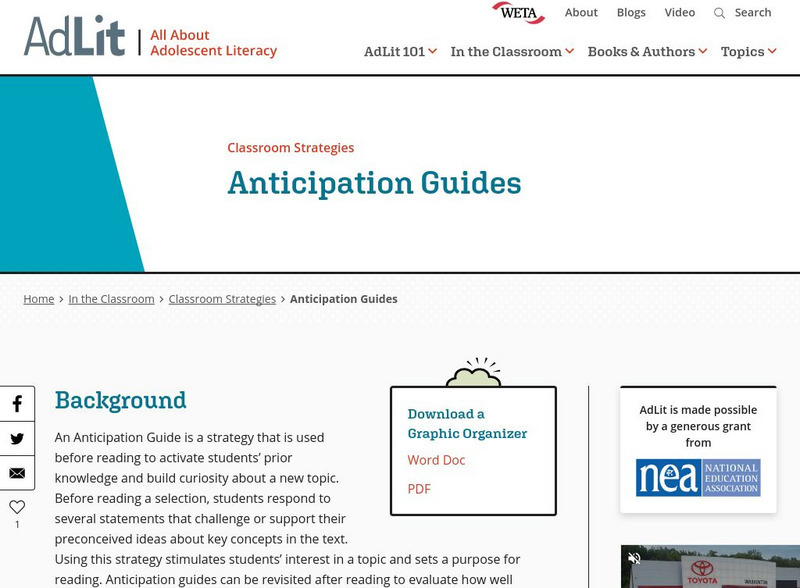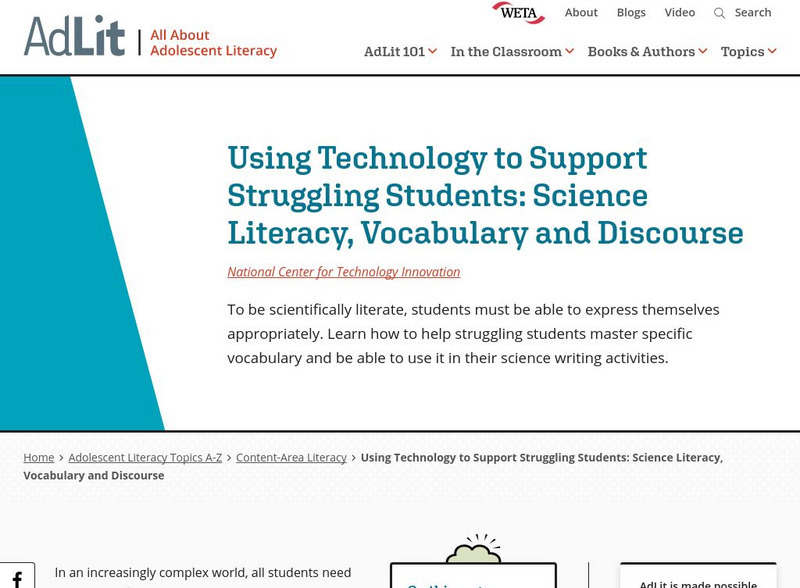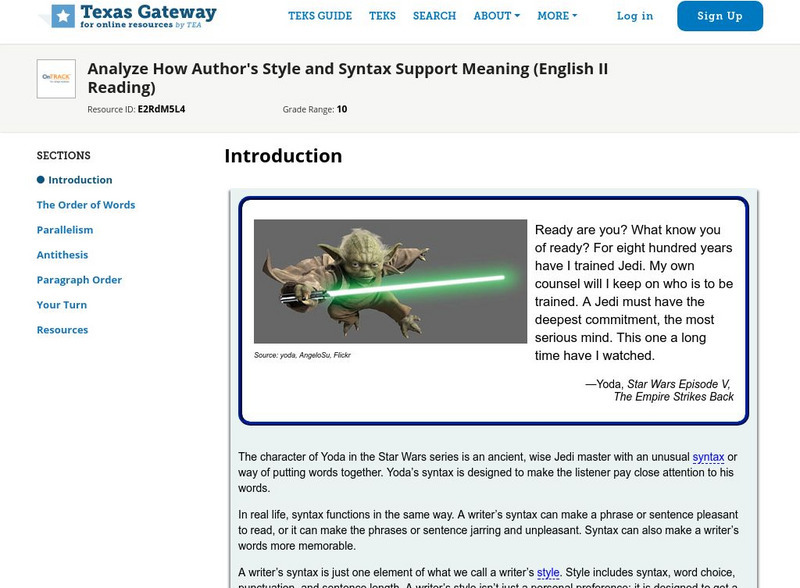Texas Education Agency
Texas Gateway: How to Read and Analyze an Essay (English Iii Reading)
[Accessible by TX Educators. Free Registration/Login Required] In this lesson's activities, you will determine the purpose of description, narration, and exposition essays, analyze their literary devices, and examine text features. You...
Texas Education Agency
Texas Gateway: Analyze Texts With Similar/different Purposes
[Accessible by TX Educators. Free Registration/Login Required] This lesson is about being able to identify the author's purpose in a specific text. Specifically, it's about looking at several authors' works on the same topic and...
Thinkport Education
Thinkport: Read Like This: Using Informational Text Strategies
In this module practice working with informational text.
Thinkport Education
Thinkport: Research Simulation Task
Engage in a research process by analyzing a variety of print and non-print texts on the subject of bullying, identifying evidence regarding the topic, and using this new information to respond to questions about the text and the topic.
Thinkport Education
Thinkport: Totalitarianism in Stalinist Russia
A module where students analyze how the author uses text structure to emphasize key points or explanations in order to achieve the purpose for writing or point of view.
AdLit
Ad lit.org: Classroom Strategies: Anticipation Guides
An Anticipation Guide is a strategy that is used before reading to activate students' prior knowledge and build curiosity about a new topic. Before reading a selection, students respond to several statements that challenge or support...
AdLit
Ad lit.org: Explicit Comprehension Strategy Instruction
Use explicit strategy instruction to make visible the invisible comprehension strategies that good readers use to understand text. Support students until they can use the strategies independently. Recycle and re-teach strategies...
AdLit
Ad lit.org: What Should an Assessment System Look Like?
The developmental nature of reading means that diagnosing the reading comprehension ability of adolescents is more challenging than diagnosing reading comprehension among third graders. In particular, assessments should not only capture...
AdLit
Ad lit.org: Using Technology to Support Struggling Students
Science learning often involves creating abstract representations and models of processes that we are unable to observe with the naked eye. Learn more about visualizing, representing, and modeling to aid struggling learners.
AdLit
Ad lit.org: Using Technology to Support Struggling Students: Vocabulary
To be scientifically literate, students must be able to express themselves appropriately. Learn how to help struggling students master specific vocabulary and be able to use it in their science writing activities.
AdLit
Ad lit.org: Content Area Literacy: Science
The demands of comprehending scientific text are discipline specific and are best learned by supporting students in learning how to read a wide range of scientific genres. Besides text structures emphasizing cause and effect, sequencing...
AdLit
Ad lit.org: Extended Writing to Learn Strategies
Writing enables students to process, organize, formulate, and extend their thinking about what they have been learning. In addition, teachers can also assign writing to help students evaluate what they know and understand about a topic....
AdLit
Ad lit.org: A Summary of "Writing Next"
What does research tell us about effective teaching techniques to help adolescents develop their writing skills? This article summarizes Writing Next, a 2007 study of adolescent writing instruction.
Writing Fix
Writing Fix: Writing Scientific "Recipes"
Adapted from a instructional activity in the book 51 Wacky We-Search Reports by Barry Lane, this instructional activity asks young scholars to read several recipes to gain an understanding of how they are written and the types of words...
Grammarly
Grammarly Handbook: Analysis
This page explains that analysis is crucial to the success of a paper as it answers the questions how and why and shows the reader that the writing is knowledgable. Logic and development work together to make the analysis clear. Examples...
E Reading Worksheets
E Reading Worksheets: Differentiated Reading Instruction Worksheets, Activities
A collection of differentiated reading activities are provided in this collection. Worksheets for the following reading topics are included: climax, story structure, elements of a story; fact and opinion; summarizing, narrative sequence;...
TES Global
Tes: Analyzing & Comparing Non Fiction
[Free Registration/Login Required] Resource notes to aid learners as they analyze different types of nonfiction. The GAP (genre, audience, and purpose) acronym is provided to use when comparing nonfiction texts.
Sophia Learning
Sophia: Reading Strategies: Tutorial
In this slideshow tutorial, students will review different types of reading strategies to promote comprehension of text. The strategies included are the following: making predictions, visualizing, questioning the text, retelling,...
Colorado State University
Writing@csu Guide: Understanding Writing Situations
In this guide, you can learn more about the situations in which writers and readers find themselves and the physical, social, cultural, and historical contexts that shape them. Click on each of the links on the right to learn about the...
Other
Siu Edwardsville: Professional Development Center: Lesson Plan: Inference [Pdf]
Lesson teaching the use of word selection, context, structure, and specific references in making inferences within non-fiction texts.
ReadWriteThink
Read Write Think: Defining and Exploring an Author's Stylistic Choices
Contains plans for two lessons that teach students how to recognize an author's use of style in literature. These plans use "Their Eyes Were Watching God" by Zora Neale Hurston as an example, but the basic ideas can be adapted to other...
Tom Richey
Slide Share: Author's Purpose and Point of View
This downloadable slideshow focuses on how an author's purpose and point of view work together in fiction and nonfiction, and how to identify the point of view.
Texas Education Agency
Texas Gateway: Analyze How Author's Style and Syntax Support Meaning
Analyze how an author's style and syntax support meaning in a text. RI.9-10.3 author unfolds. CCSS.ELA-Literacy.CCRA.L.3
Lumen Learning
Lumen: Writing Process: Prewriting
This lesson focuses on prewriting including the purpose and characteristics of prewriting, prewriting strategies, the rhetorical context, and developing a working thesis statement. It also includes a slide show about author, audience,...






















